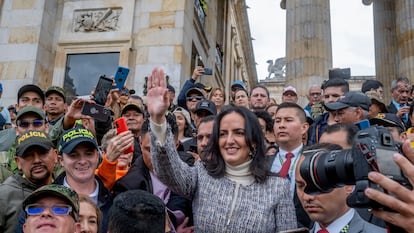The Colombian ‘Bukeles’ want power
A survey found that 55% of Colombians would like to have a president like the one in El Salvador; meanwhile, some local candidates are promising to import his rigid security model


Nayib Bukele likes to say that he was chosen by God. Now, he will also be able to say that he has been chosen as the alter ego of the Colombian extreme right. A few years ago, when the seed of the far-right Vox party was still germinating in Spain, its leader, Santiago Abascal, coined a term: “the cowardly little right.” He was using it to refer to the traditional conservative parties in Spain, such as the People’s Party (PP), which had been alternating the power with the socialists since the restoration of democracy. Abascal’s argument was that that right had lost its essence and that he and his people represented the true, brave right. This division between a right wing seen as pure, and another one dismissed as watered-down, quickly spread throughout Europe, and is now spreading throughout Latin America, too. There is Kast in Chile, Bolsonaro in Brazil, Milei in Argentina, and it is also making its way in Colombia, where in the absence of national leadership, more and more people are looking outside their borders for a model to import: that of the authoritarian Salvadoran president.
Colombia is entering its electoral season. Local elections will be held on October 29, a key date for President Gustavo Petro, not only because they are the first elections of his term, but also because they will decide if the regional power is on his presidency’s side or on the opposite. The timing is not optimal for the traditional right, which comes from a slump after a failure in the 2022 general elections, where its presidential candidate did not even make it to the second round. The visible heads of the opposition are blurred, leaving the spotlight to the senator of the most radical wing, María Fernanda Cabal, who a couple of months ago was one of the first to declare herself an admirer of the Salvadoran president. The spark caught on, to say the least: a Datexco survey for W Radio published this week ensures that 55% of Colombians would like a president like Bukele for their country.
In a nation that has known little peace, a cradle of guerrillas, paramilitaries, drug traffickers and criminal groups, security has always been at the center of the debate. The right, as has happened in other countries, capitalizes on its defense and the armed forces. This is due, in part, to the security policy implemented by former president Álvaro Uribe, who came to power at one of the roughest moments of the war and managed, with a firm hand, to corner the FARC and curb the brutal violence that not only affected the inhabitants of the regions, but also had the residents of the capital city of Bogota locked in their apartments. Uribe earned the respect of many who prioritized security over human rights, even if the former president’s two terms were marred by the falsos positivos scandal, a system that rewarded the military for the number of deaths and which took the lives of 6,000 innocent civilians who were falsely identified as guerrillas.
For many Colombians, Bukele is a reminder of that Uribe whom they miss so much and no longer recognize. The former president now lives with only one foot in politics; his most notable interventions of recent times have been his surprising statements in favor of Petro, with whom he has already met three times and whom he even defended in an event in which a person began to rant against him for being a former guerrilla member. “There will be no insults for the president in my presence,” the politician said. From that day on, the most fervent followers of Uribism assumed themselves as leaderless.
The president of El Salvador embodies everything that Uribe used to be, but taken to the next level. Bukele has focused all his politics on the war against gangs and has managed to reduce violence by accumulating abuses against rights and freedoms. Salvadorans, used to decades of violence that gave the country the questionable distinction of being the most violent in the world, forgive him everything; he is the most popular president in the region.
Last week, Bukele proudly celebrated that his country has reached, according to him, 365 days without homicides — an alleged peace that was later broken with the murder of a policeman. The president’s response was furious: “Let all the ‘human rights’ NGOs know that we are going to wipe out these damn murderers and their collaborators, we will put them in prison, and they will never get out. We don’t care about your pitiful reports, your pre-paid journalists, your puppet politicians or your famous ‘international community,’ which never cared about our people. We will heal our country and get rid of this plague completely. Take your failed recipes elsewhere.”
The Salvadoran’s recipe has been seen in recent months through the images of thousands of tied-up, half-naked, kneeling gang members, ready to fill what is already the largest jail in Latin America, a prison built by the president to hold 40,000 people. That prison has also entered the Colombian debate.
“Do you agree or disagree with the mega-prison that President Nayib Bukele of El Salvador built?” asked the same survey in Colombia. 67% answered yes. The question, beyond an apparent campaign to bukelize Colombian politics, is relevant because Petro had attacked the prison through Twitter. Cabal was able to attract Bukele to Colombia, but President Petro was vocal for a couple of weeks, in which he referred to the Salvadoran many times on social media. Semana magazine also took advantage of the noise and gave him a cover with the title: “The Bukele Miracle.”
As insecurity continues to be one of the main issues in the country, imitators have not taken long to appear. The total peace that Petro is pursuing to pacify the country by negotiating with all the criminal groups has not yet borne fruit. Meanwhile, in recent days, a right-wing candidate for mayor of Cali, Jaime Arizabaleta, has been presenting himself as the Colombian Bukele. “One has to seek advice from those who know. That is why I will approach the Bukele administration to see what we can adapt from its security model so criminals, thieves and killers get what they deserve,” he said.
He is not the only one. A candidate for mayor of Valledupar, Camilo Quiroz, who has not been a member of the right, even traveled to El Salvador last week, and stated: “I feel for Valledupar, and I am willing to cross borders to protect it. Insecurity is fought hand in hand with those who know; for this reason I thank the government of Nayib Bukele and the mayor [of San Salvador] Mario Durán, for opening the doors of San Salvador to me and for being willing to visit Valledupar to help us overcome this wave of violence and crime.”
There are still five months left for the local elections, the candidacies are still being defined, and it remains to be seen if the devotees of the Salvadoran do win when the time comes. However, a quick glance at Twitter is enough to see that the followers of this model keep increasing. Just one example is an account, signed by “Opositor,” that from time to time publishes the message: “We urgently need a Bukele for Colombia.”
Sign up for our weekly newsletter to get more English-language news coverage from EL PAÍS USA Edition
Tu suscripción se está usando en otro dispositivo
¿Quieres añadir otro usuario a tu suscripción?
Si continúas leyendo en este dispositivo, no se podrá leer en el otro.
FlechaTu suscripción se está usando en otro dispositivo y solo puedes acceder a EL PAÍS desde un dispositivo a la vez.
Si quieres compartir tu cuenta, cambia tu suscripción a la modalidad Premium, así podrás añadir otro usuario. Cada uno accederá con su propia cuenta de email, lo que os permitirá personalizar vuestra experiencia en EL PAÍS.
¿Tienes una suscripción de empresa? Accede aquí para contratar más cuentas.
En el caso de no saber quién está usando tu cuenta, te recomendamos cambiar tu contraseña aquí.
Si decides continuar compartiendo tu cuenta, este mensaje se mostrará en tu dispositivo y en el de la otra persona que está usando tu cuenta de forma indefinida, afectando a tu experiencia de lectura. Puedes consultar aquí los términos y condiciones de la suscripción digital.








































